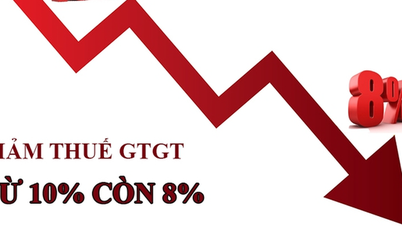VCCI proposed that the Ministry of Finance allow online sellers to pay taxes by lump sum and postpone the collection of online sales tax by 3 months.
The Vietnam Federation of Commerce and Industry (VCCI) has just sent the Ministry of Finance a document with comments on the draft decree regulating tax management for business activities on e-commerce platforms and digital platforms of business households and individual businesses.
Notably, VCCI proposed to postpone the collection of online sales tax by 3 months.
The draft is expected to take effect from April 1, 2025. According to VCCI, according to businesses' feedback, the effective date is relatively urgent (less than 2 months left), while the document is still in the draft stage, businesses need time to build information technology systems, human resources and propaganda for sellers.
Therefore, to support businesses to have time to prepare technology systems, human resources and guide sellers, VCCI proposed to postpone the application date of the regulation to July 1, 2025, 3 months later than the draft.

VCCI believes that tax collection is necessary, but it is necessary to develop a tax collection method that ensures minimizing administrative procedures and compliance burdens for businesses and individuals.
At the same time, with the participation of many subjects in the new method, regulations also need to clearly define the responsibilities and obligations of the parties to serve as a legal basis for implementation.
Furthermore, the draft does not allow individuals doing business on e-commerce platforms to pay taxes using the lump-sum method. "It is possible that the drafting agency speculates that all e-commerce businesses use software and can quickly extract revenue data, so the declaration method can be applied," VCCI said.
However, this unit assessed that the above regulation is not suitable for individuals who are new to business or have small scale. Due to small capital, these individuals do not buy business support software and will have difficulty in making the above declaration.
Therefore, VCCI recommends that the drafting agency consider amending in the direction of allowing declaration according to lump-sum tax applicable to business individuals with the number of orders below the threshold (information on the number of orders can be extracted through shipping units).
In addition, the draft requires individuals doing business on e-commerce platforms to declare business expenses. According to VCCI, this is unnecessary because tax is calculated on revenue.
Furthermore, the requirement to declare in detail the cost of capital, labor costs, electricity, water, transportation, and advertising marketing will create a great burden on individuals.
VCCI also disagrees with the regulation that e-commerce platforms are responsible for transferring deduction documents to tax authorities.
According to the business's reflection, this regulation is not appropriate. Because the floors have declared in detail and fully the amount of tax deducted each month to the tax authority and the tax authority has full information and data about the taxpayer and the amount of tax payable.
Therefore, VCCI believes that the mandatory transfer of tax deduction voucher data in large volumes (millions of vouchers per year) will increase costs for businesses.
In addition, the draft stipulates that taxable revenue is the total amount of money from the sale of goods and services that the e-commerce platform collects from the buyer.
According to VCCI, this regulation is understood that the seller's revenue will be the total amount paid by the buyer. This is not appropriate because each transaction made through the platform includes many products/services such as the seller's products/services, shipping services, platform services, payment services... Thus, the amount the buyer pays for the transaction is the total amount paid for the above services, not just paid to the seller.
Therefore, to ensure reasonableness, VCCI proposes that the drafting agency amend in the direction that taxable revenue is the amount of money that the e-commerce platform expects to pay to the individual business.

Source: https://vietnamnet.vn/kien-nghi-lui-thoi-gian-thu-thue-ban-hang-online-them-3-thang-2372991.html


![[Photo] President Luong Cuong attends the inauguration of the international container port in Hai Phong](https://vphoto.vietnam.vn/thumb/1200x675/vietnam/resource/IMAGE/2025/5/13/9544c01a03e241fdadb6f9708e1c0b65)

![[Photo] Prime Minister Pham Minh Chinh meets with US business representatives](https://vphoto.vietnam.vn/thumb/1200x675/vietnam/resource/IMAGE/2025/5/13/5bf2bff8977041adab2baf9944e547b5)




































































































Comment (0)